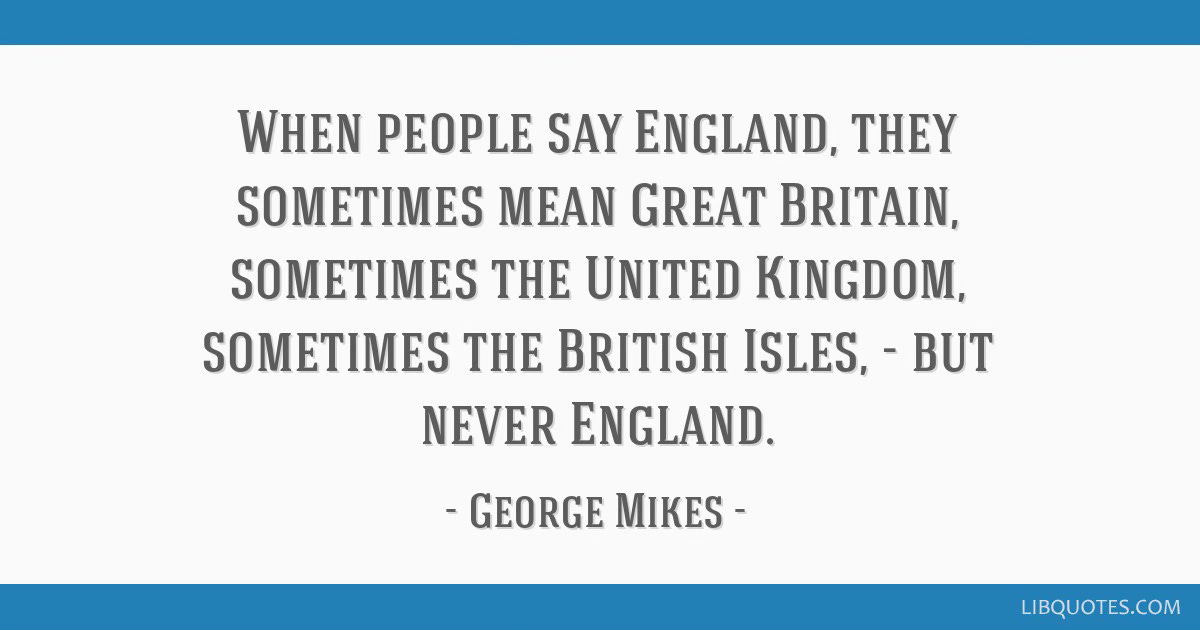King of England my arse!
How the UK and Scottish Parliamentary systems are set up and how to piss off Americans who refer to the "King of England"
Summary
This article shows the setup of the Parliamentary system in Scotland using the US and Australian government systems as comparative examples. Among topics discussed:
Geographic areas of the UK with different names
Devolved parliaments v Central parliament and their respective legislative powers
Why can Scottish MPs vote on purely English issues but not vice versa?
Contents
Introduction
This article shows the setup of the Parliamentary system in Scotland using the US and Australian government systems as comparative examples.
There are numbers of MPs listed in the article which are current as at November 2023 but will vary from time to time based on based on parliamentary elections, by-elections (death, retirement, caught in a brothel etc.) and MPs switching parties.
Parliamentary election dates typically with the largest changes:
UK Parliament: Last general election December 12th 2019, next one due est. May 2024
Scottish Parliament: Last election May 6th 2021, next due 2026
The King of England and the President of Washington
The United Kingdom - of which we have a King - is composed of multiple countries - England, Scotland, Northern Ireland, Wales (plus various smaller islands and territories not shown on the map below for simplicity).
The Island of Ireland is split into Northern Ireland (part of the UK) and The Republic of Ireland, a sovereign country that is part of the EU (the UK formally left the EU in 2019).
And this is why it pisses off any Scots person when typically Americans say “I just love the King of England!”. A good counter is “Gee you guys, I just love President Biden of Washington State!” (have your map above and a pointer ready to explain).
I imagine Welsh people must be particular pissed off. Charles was the Prince of Wales prior to his coronation - has he now just graduated to “The King of England”? 🏴😡
I’ve also often had countless times Australians in Sydney say on hearing my Scottish accent “hey nice accent are you Irish?” to which I reply “ah you Kiwis all sound the same”! 🖕🇦🇺🇳🇿😉
Who speaks for England?
Each of the countries in the UK (with the exception of England) has some form of devolved Parliament - essentially the equivalent of Australian or US State Governments.
The lack of representation for England with it’s own House specifically is essentially historical since prior to 1997 there was only one central Parliament in the UK (Westminster) but also legal since Scotland and England have different legal systems.
The central UK Parliament therefore deals with not just issues of national relevance, but also those specific to England.
But this begs the question - why can Scottish or Welsh Westminster MPs who represent constituencies in their own countries (which have their own devolved Parliaments as a separate body for regional issues) vote on issues affecting England exclusively, when MPs from England cannot vote on issues affecting Scotland or Wales?
This quandary is known as The West Lothian Question1 2 and is a fair point.
But in considering setting up an English Assembly or equivalents - there’s a fair bit of division between “Hardy Northerners” and “Soft Southerners” in England! And London is a multi-cultural microcosm in itself as a constituency. See this graphic below from the Poke - “stereotypes of the UK from a North Londoner’s point of view map” - described as funny but accurate!
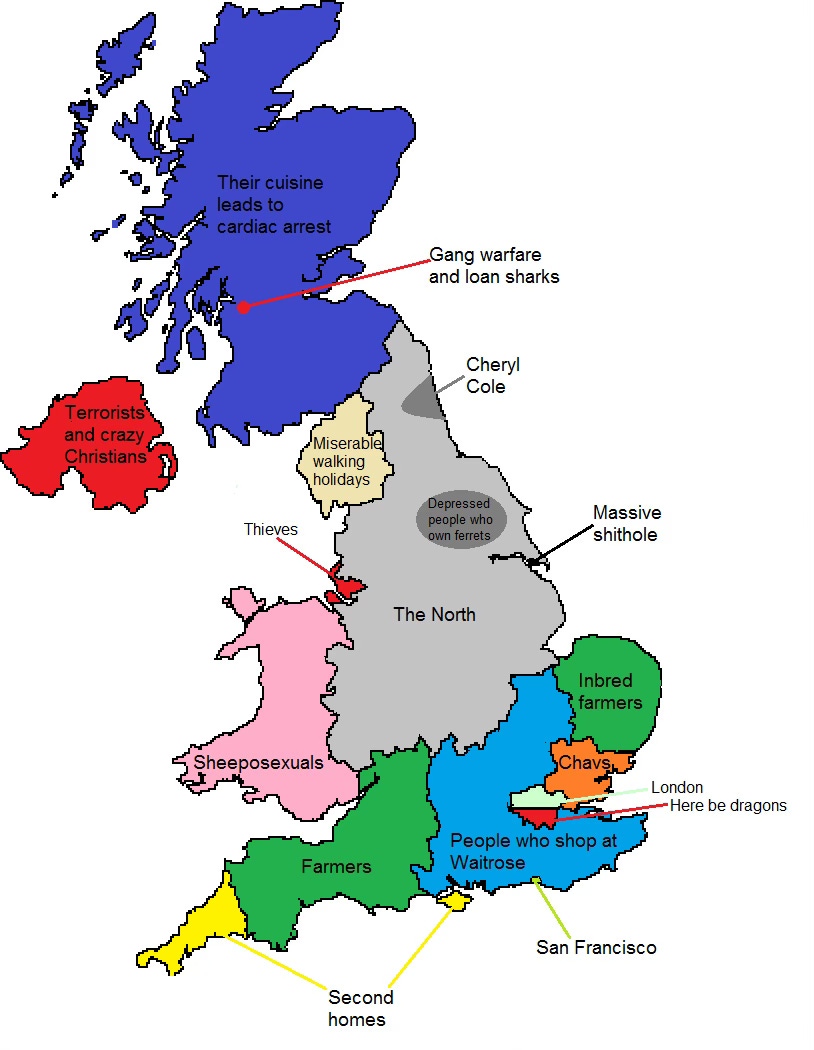
Lots of Parliaments, Capitols and a Congress
A summary of how the UK Parliaments represent - with reference to the Governing bodies of Australia and the US for comparison.
Considering the UK’s devolved Parliaments, you could think of the Scottish Parliament the equivalent of the New South Wales (NSW) Parliament in Australia or the California State Government in the US.
Regional Bodies:
UK, Scotland - Scottish Parliament (first sitting 1998) - First Minister Humza Yousef, Parliament: Edinburgh. Politicians referred to as “MSPs” (Members of the Scottish Parliament) to differentiate from national “MPs” (Members of Parliament)
AU, NSW State - NSW Parliament - Premier Chris Minns, Parliament: Sydney (called “The Bear Pit” due to the robust debate!)
US, California State - California State Legislative - Governor Gavin Newson, California State Capitol: Sacramento
Federal (National) Bodies:
UK - UK Parliament - Prime Minister Rishi Sunak, Parliament: Westminster, London.
AU - Australian Federal Parliament - Prime Minister Anthony Albanese, Parliament: Canberra.
US - US Congress - President Joe Biden (OK simplified - Presidential System Biden doesn’t actually sit in Congress but you get the picture - most senior country rep), House of Congress: Washington.
Australian politics and exchanges of view are … more robust than other Parliaments I have attended.
I was in Canberra some years ago in the gallery watching a debate, and I was sitting next to an American Law Professor. As the politicians smashed into each other he sat there open-mouthed saying “oh my gawd! oh my gawd!” so shocked was he - clearly that wouldn’t happen in Congress!
That’s a lot of politicians
With the exception of the Scottish Parliament (which has just one Chamber), each regional or national Government chamber is split into upper and lower houses.
In the US for example Congress split into:
House of Representatives - headed by Speaker Mike Johnson
Senate with President of the Senate Vice President Kamala Harris
Therefore across any State/Country there is a “doubling-up” if you like in a geographical area of National MPs representing the central Parliaments and local State/Country MPs representing the local Parliament PLUS dual-chambers.
And then you have even more localised councils and mayors…. (“tripling up”!)
That’s a lot of wages, infrastructure, travel and massive dodgy expense accounts or as my MBA Economics lecturer used to say using a charming term from the Australian Racehorse industry “wastage”!
Out of interest I had a look at how many politicians you might have in the US in total and found this article which looks to be from around 2012 but I imagine it’s much the same…

Powers of the Scottish Parliament
In the case of the Scottish Parliament they are given a number of areas they can legislate on (devolved powers) and there are other areas that they cannot (reserved powers)3.
The UK Government also possesses the right of veto - where they can overturn a law passed in the Scottish Parliament.4 This has only happened once in the history of the Scottish Parliament in January 2023 when a Gender Reform law passed in Scotland on trans rights was overturned by the UK Government.5
MPs and MSPs
So as noted in Scotland you have two sets of MPs
MPs sitting in the UK Parliament in Westminster representing on UK-wide issues (59 in total representing Scottish regions out of 650 UK-wide MPs). Note the SNP does not have representation in the Upper Chamber (House of Lords) since they do not believe in this unelected body that reviews laws of the land and calls for it to be scrapped.
MSPs sitting in the Scottish Parliament in Edinburgh representing on Scottish issues only (73 in total across Scottish constituencies). There is no Upper Chamber in the Scottish Parliament, unlike Westminster. Regarding the 73 MSPs - there is a further complexity in regional constituency seats … but let’s park that for now!

SNP - The largest party in Scotland in both Houses
The largest party in Scotland - both in Scottish MPs in Westminster and MSPs in Edinburgh is the SNP.
Split in the houses:
Of the 59 MPs in the House of Commons from Scottish constituencies, the SNP comprises 43 (73%)
Of the 73 MSPs in the Scottish Parliament, the SNP have 63 (86%). Though this is the largest number they actually are just short of a voting majority, which is based on regional seats also. But let’s leave that for now to simplify with bums-on-seats in the Chamber.
The SNP is led by MSP for Glasgow Polok, SNP Party Leader and the Scottish Parliament’s First Minister Humza Yousaf.
Looking at the SNP dominance of both houses below.
SNP in the UK Houses of Parliament
The split of the 650 MPs in the House of Commons by Party:

The split of the 59 MPs in Westminster representing regions in Scotland:
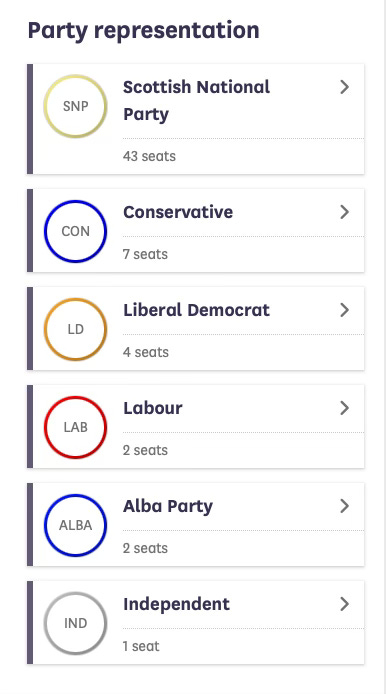
SNP in the Scottish Parliament
Of the 73 MSPs in the Scottish Parliament, the SNP is clearly the largest party (but recall just short of a voting majority with regional votes):
The growth of the SNP in the Scottish Parliament
With respect to the 73 MSPs in the Scottish Parliament in Edinburgh, the illustration below illustrates the growth of the SNP vote with respect to the balance of MSPs in the Scottish Parliament from 2016 - 2021 (last election May 2021).
The “UK New Labour” Government under Tony Blair after winning a landslide victory in 1997 created the Scottish devolved Parliament, reflected in the majority Labour MSP composition in 1999 first sitting.
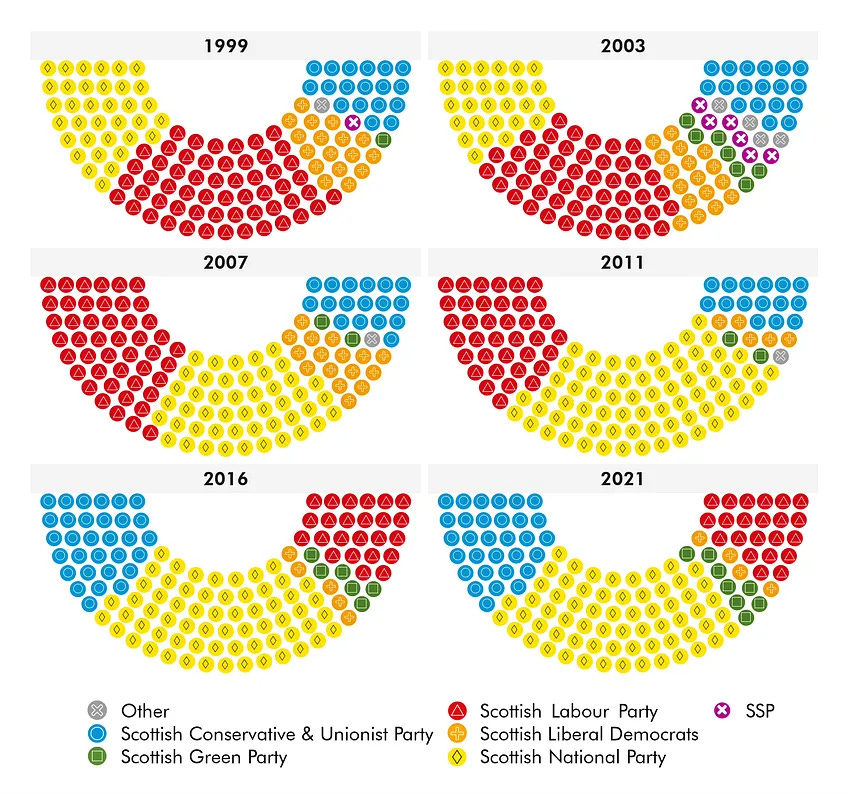
In Conclusion
There’s loads of MPs all over the place and it’s complex how the parliaments are set up.
The Scottish Parliament launched in 1999 has a nice new very expensive Parliament building opened by The Queen in 2021 “just doon the road” outside the Royal Palace of Holyrood in Edinburgh.
It has been accused of looking like a student Halls of Residence with its bold design and like all infrastructure projects in Scotland was estimated to cost between £10-40 million to build and ended up costing £414 million.
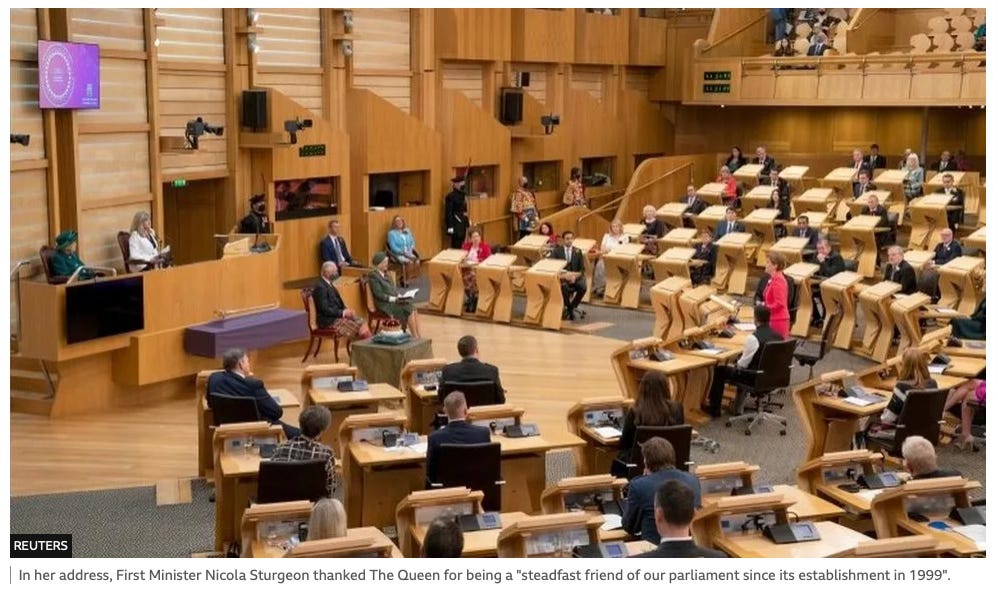
The SNP is the dominant force in Scottish politics both representing Scotland as a region in the UK Parliament in Westminster and in the Scottish Parliament itself.
Related Articles
The SNP party with its central policy of an independent Scotland has a certain political agenda in UK and Scottish politics.
Discussed in the follow-on article here: “Scots - We’re no like you by the way”:
Guardian What is the West Lothian question and why does it matter? - 19 Sep 2014 - https://www.theguardian.com/politics/2012/jan/17/what-is-west-lothian-question
UK Parliament Website - The West Lothian Question - https://www.parliament.uk/site-information/glossary/west-lothian-question/
Scottish Government Website Devolved and Reserved Powers - https://www.parliament.scot/about/how-parliament-works/devolved-and-reserved-powers
UK Parliament Legislation Website: The Scotland Act 1988 Section 35 - https://www.legislation.gov.uk/ukpga/1998/46/section/35
The Guardian The Scottish trans rights law that has turned into a constitutional crisis: 18th Jan 2023 - https://www.theguardian.com/world/2023/jan/18/scotland-gender-bill




